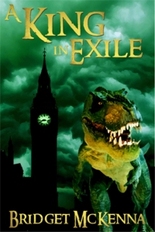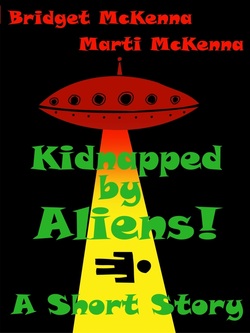
The story behind the story begins with two writers working at a large computer game company in the early 1990s, in a cubicle of a nice size for one writer. One small writer who doesn't move around much.
But as luck would have it, it holds two—a mother-daughter team whose duties include writing ads, magazine articles, sales copy, box copy, and documentation, and editing game designers' in-game text. Two desks and two writers pushed up against one another 8 hours a day (when we were lucky) five days a week, for more than a year. That's why we made the big bucks.
Oh, wait...the pay was crap.
Well anyway, that's why we collaborated at work, and we also wrote together on our own time. And this particular collaboration has recently been dusted off and re-imagined as what we think is a better story with more interesting characters than when it was originally published in Tomorrow SF, in 1995, edited by Algis Budrys.
Kidnapped by Aliens!, the Making-Of Special
What follows is the afterword included in the back of the book that is now live on amazon.com. You can read it here even if you don't shell out 99c. But of course you're welcome to do that, too. So without further ado...
BMcK: I remember how we started writing this. We were working at Sierra On-Line around 1991. We shared a cubicle sized for one, so we wrote in one another’s pockets for well over a year.
This was about the same time we were working on “Remarkable Things,” another story set in the universe of tabloid stories, though I don’t remember which one came first. Anyhow, you mentioned someone you’d like to see “disappeared,” and quickly amended that you didn’t want any harm to come to them, but maybe they could just be kidnapped by aliens.
As so often happened in those days, one of us said “I feel a story coming on,” then we said in unison, “Kidnapped by Aliens!” And so the title was born, exclamation point and all.
I’ve lost some brain cells were this story’s concerned. We both left Sierra in 1991, but if it appeared in Tomorrow SF in 1995, we couldn’t have sold it any earlier than 1994. Did we send it to a lot of other editors first?
MMcK: Yeah, it made the rounds before Algis Budrys decided it was just the thing for his magazine. And I remember that moment. Re-reading the original draft of the story, it hit me that we were more cynical in those days. Our main character wasn’t very likable from where I’m standing now. It made me happy to give him a workover for this release—he’s a better man for it.
BMcK: Yeah, I wouldn’t like that guy (er, Guy) much now. He was a lot shallower. I think we were playing the humor angle a little harder back then, and painting with broader strokes. It’s been a real education in how we operate as writers to go back over this story.
MMcK: Yeah, it was satisfying to bring it up to a new standard. We’re publishing a better story than we did back then.
So, we should talk about how we collaborate. Over the years we’ve encountered so many writing-team permutations, and I think they’ve all had a different way of working together.
BMcK: Right. Some partnerships have one person do a rough, the other polish it. Some divide characters between them. And I remember that one well known science fiction writing team we were on a panel with said that no-one should ever collaborate unless there was no other way to get the story written. I’m glad we didn’t hear that before we started, because in our experience, collaboration was tremendous fun.
Our particular method of collaboration was usually to sit down and throw ideas around and get an overview of the story and events, which was open to change as we went along, of course. Then somebody would start. In this case, it was you who wrote the opening scene. Then we’d trade back and forth until we got to the end. Then we’d fiddle with it.
MMcK: Re-reading it, I can honestly say I don’t know who wrote what 99% of the time. But back then, we’d each write a scene, hand it off, edit the other person’s work and then write the next scene. And we always knew who was responsible for what…except for that one time.
BMcK: Ah, yes. That one time. We were collaborating on “Remarkable Things,” which was about two very different families who lived next door to one another. The children get acquainted as the story opens, and at some point we realized that the mothers would have to get together for coffee and get to know one another. The problem was, neither of us really wanted to write the scene. “I think you should write it.” “No, I think you should.” Lather, rinse, repeat.
So one day the scene appears in the latest draft, and one of us says, “Hey, good job on the Moms scene,” and the other one says, “What’re you talkin’ about? You wrote it.” “No, you did.” “I totally didn’t.” We finally decided our “third writer” must have written it. None of the stories we collaborated on ended up much like what either of us did on our own. In fact, fellow writers trying to guess who’d written which scene were almost always wrong. Between us we made a third writer.
MMcK: It was so bizarre. We were both so certain we hadn’t written it! Maybe it was a ghost writer…
Anyway, I think that’s one thing a lot of writing teams have in common. Collaboration is a different way of creating—I think we were able to egg each other on and validate each other’s ideas in a way that the solitary writer can’t. Writing is generally a lonely business and writers spend a lot of time doubting themselves, so these partnerships can be sort of freeing in a way.
BMcK: Exactly. Half the story is someone else’s responsibility; somehow it’s easier to just have fun with it.
So all these years later we come back to this story. We still like the fun of the idea, but Guy and Carol-Ann needed some major tweaking to make them more likable. And there were anachronisms we needed to zap, too. In the original story, Guy wears a tie to go to work at a software company. Back then there were still a few companies—especially in productivity software, which is what Guy writes for—where people still dressed up to go to work. But not these days. Zap! Guy goes to watch a video, but wait—it’s a VHS tape! Zap!
MMcK: Yes, in order for the story to work in this century, we had to lose anything that would thrown the reader out of the story. In a few years, DVDs might seem ridiculous, but for now the story flows more naturally with these updates in place. And as I said, I think overall we’re publishing a better story this century than we did in the last one.
BMcK: I agree. I think we ought to do it again.
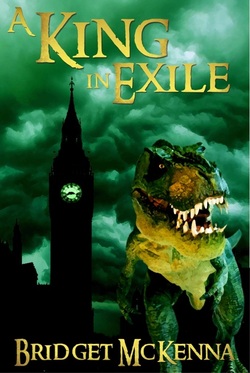
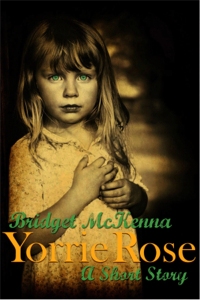
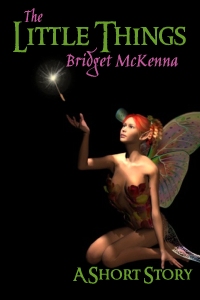
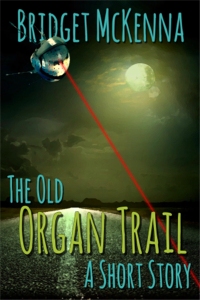

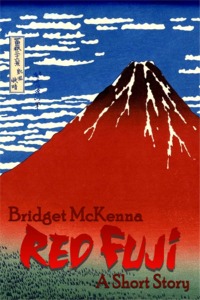

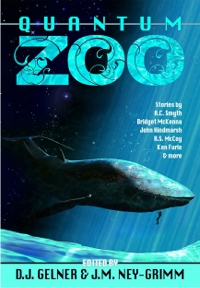


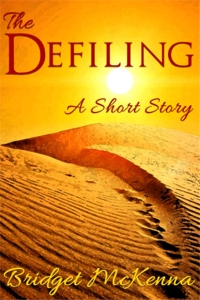
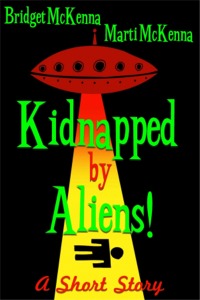
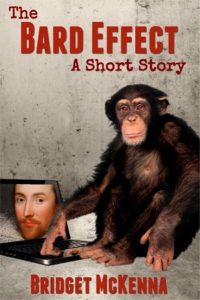
 RSS Feed
RSS Feed


